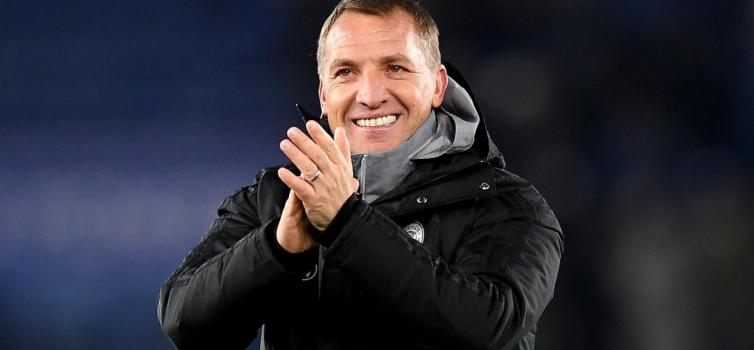Brendan Rodgers: 'Body language on the side is so important'

Rodgers took over as Leicester manager in February
Written by Simon Austin — December 19, 2019
LEICESTER CITY manager Brendan Rodgers says his late father inadvertently taught him the importance of displaying a “calmness” on the touchline.
“Body language on the side is important,” Rodgers told The Athletic. “The last thing I want is a player to look over at me and it is a negative, because I’m there with them. I am there for them, I want to help them.
“It doesn’t help them if they look over and I am doing all sorts. I think it goes back to my father. When I played, I used to look over at my dad and he would be holding his fist up to me.
“God rest him, because if he was here he would be laughing, but as a young player I used to look at him on the sidelines and he would be all emotional, telling me I had to do better.
“I don’t think it helped me. Later in life I found that. My job is to help, not to have that negative effect. I have always done that. Part of that is if you can have that calmness that can help your team."
Rodgers also went into more detail about how he communicates with his players before, during and after a game:
Pre-match
“I work closely with the players and try to ensure they have clarity in their work. If they say they are pretty clear on the job they have been asked to do, then they’re not. I need them to be really clear. In order for them to do that it’s about coaching and being clear in your communication with them beforehand.
“If they go into games and understand exactly what it is they’re doing, it helps. Sometimes before a game we have had a team sheet come through and we have prepared our plan for the game but then we have realised they (the opponents) are playing another system and you have to then react.
“It is a case then of pulling the players in before they go out to warm up and say, ‘Listen, this is what we’re going to do and this is what they’re going to do. So you need to be ready for it.’ That means they can go into the game and, if anything happens, they’re not surprised by it.”
During the game
“I don’t waste time. I analyse the game when I am in the game, to try to help the players from a tactical perspective. Yes, I make a lot of notes - In the game I am looking at defensive items.
“That first 10 minutes, I am analysing how the other team are playing. I am then communicating with my staff to get clarification on what I am seeing from their position.
“I don’t want to motivate the players, because that is already done. I don’t ask them to run harder because they know that is their obligation. It is not a choice. That is what they are there to do. That means I can tactically look at the game."
Half time
“I chat to my staff, make my notes and then at half-time I have five minutes with my staff and then highlight the key areas, defensively and attacking, and deliver a clear message.
“More often than not, it is about tactical elements in the game. Sometimes it is just about sheer emotion. All managers are different but I tend to be calm even though sometimes inside you are not.
“The passion is still there but it is about delivering a clear message to players, not stupid things that don’t actually help them in the game. When they come out after half-time, I want them to think, ‘OK, that’s what he wants us to do.’ Not, ‘He’s just spent 10 minutes slaughtering us’."
Open door policy
“I say to the kids at the training ground that if they have an issue my door is always open and I will never judge them. Whether it is a professional or a personal issue.
“If it is personal, let me help you lift the burden. If it is a burden, then come to me because I will never judge you, because at the end of the day you are a young man who is making his way in the game.
“I have been aggressive with the players, but I never want to say anything that can really hurt them. Sometimes you must be harsh at this level, harsh to be clear. You don’t have time to tiptoe about. It is about clear communication. You have to be clear with your message.”
You can read the full article HERE.




-1.png)





